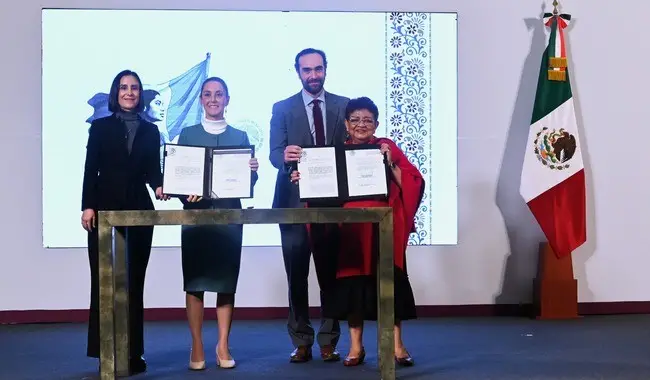
The railway reform once again gives the State the ability to operate passenger trains
The LOAPF will be modified to reduce the 5% of the government cost to the people of Mexico and create the Secretariat of Women, the Secretariat of Science, Humanities, Technology and Innovation and the Digital Transformation Agency
During the morning conference “Las Mañaneras del pueblo”, the Constitutional President of the United Mexican States, Claudia Sheinbaum Pardo signed the decree through which the Federal Electricity Commission (CFE) and Petróleos Mexicanos (Pemex) return to being companies of the people of Mexico, this after the recent approval of the energy reform by the Chamber of Deputies, the Senate and the majority of local congresses.
“Pemex and CFE return to being companies of the people of Mexico. And our commitment that they will be efficiently operated companies that will provide services, fuels and electricity at affordable prices for all.”
He assured that this reform is a strategic axis for national development, since Pemex and CFE are no longer considered productive companies of the State, as the 2013 reform proposed, and are once again public.
“It is important to know that there is also a space for private investment, that is, Pemex and CFE are once again public companies of the people of Mexico and there is still a space for private investment, which will be established in an orderly and certain manner in the secondary laws.”
He also signed the decree by which the State will once again be able to operate passenger trains. He recalled that preliminary studies are currently being carried out for the construction of the routes: Mexico – AIFA; AIFA – Pachuca; Mexico – Querétaro, with the aim of starting the works in April 2025. In addition, a freight line will be built for the Mayan Train and the K line of the Interoceanic Train.
In addition, she reported that today the amendments to the Organic Law of the Federal Public Administration (LOAPF) were sent to the Chamber of Deputies, which contemplate the five percent reduction of the cost of the government to the people of Mexico, as well as the creation of the Secretariat of Women, the Secretariat of Science, Humanities, Technology and Innovation and the Digital Transformation Agency, which will come into operation as of January 1, 2025.
“President López Obrador had already reduced the costs of the government and now, we have reduced them by another 5 percent, removing duplication of functions that still existed in different Secretariats. So, although these three new areas are created, the cost of the government to the people of Mexico is reduced even further.”
The Secretary of Energy, Luz Elena González Escobar, stressed that with the approval of the energy reform in which articles 25, 27 and 28 were modified, “the State is taking back something that should never have been lost.”
He explained that, with the 2013 reform, CFE and Pemex became productive companies that competed with each other, so their resources, which are a fundamental part of the country’s national and energy sovereignty, were a commodity, and with the initiative approved in 2024, both companies return to being State Public Companies, which gives them precedence for the continuity, security and accessibility of all Mexicans to their services.
He announced that with the energy reform, lithium is also incorporated as a strategic area of the Mexican State.
“We are very happy, because today this agreement is signed that returns to the people of Mexico two companies that are fundamental for the development of the regions and for the development of the country.”
The general director of the Railway Transport Regulatory Agency (ARTF), Andrés Lajous Loaeza, reported that the reform in railway matters consists of the fact that in constitutional article 28 the passenger train is established as a priority area, so the State “recovers the possibility of operating trains on the country’s railways” and the Federal Executive is given the option of granting assignments to public companies or concessions to private parties for the provision of services.
He specified that the Government of Mexico will continue and accelerate the return of passenger trains—started in 2018 by former President López Obrador—, so 3 thousand kilometers (km) of railways will be built, for which work has already begun on the construction of three new routes:
The Mexico – Pachuca train, with a journey time of one hour and 20 minutes, which means a saving of approximately 25 percent in travel time; the Mexico – Querétaro train, whose trip represents a 40 percent time saving, and finally the cargo line of the Mayan Train.
At the morning press conference, the “Mañaneras del pueblo” (People’s Morning Press Conference), Miguel Ángel Elorza Vásquez, coordinator of Infodemia, presented the section “Lie Detector,” where some of the fake news spread in recent days on topics such as the reform of articles 105 and 107 of the Constitution or the new Well-Being Program, Health House by House, were refuted.
The President of Mexico was also accompanied by the legal advisor to the Federal Executive, Ernestina Godoy Ramos.
Source: gob






